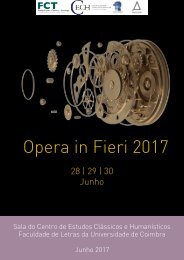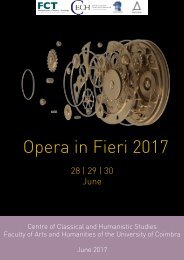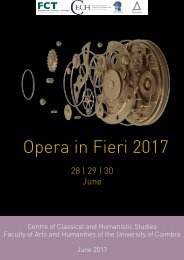Resumos PT
Create successful ePaper yourself
Turn your PDF publications into a flip-book with our unique Google optimized e-Paper software.
in their physical body and corporeality through this immaterial constellation of ethical<br />
practice. According to the research carried out on the lectures themselves, it is apparent<br />
that within Foucault's analysis of the body and its corporeality, that the relation not only<br />
to body and ethics is made, but also the problematic opposition in Western Philosophy<br />
between the soul and body, and also the soul and mind. Foucault's understanding<br />
stretches from the Greek to the Early Church Fathers, attempting to collate them all<br />
under the term of parrhesia or truth-telling, which means to enact a dialogue with<br />
another person and body, and in doing so, one creates a self and the other, and creates<br />
the governance of what can be said with the body, and made with one's corporeality<br />
within a given historical context. Furthermore, the notions of animality and monstrosity<br />
are discussed within the lecture Abnormal (1974-1975) French edition 1999, English<br />
translation 2003 which shows how the definition of the human being is defined in respect<br />
to the animal body, and the monstrous forms of human bodies that resemble or are<br />
compared to animal ones to make them grotesque. In conclusion, this paper shall outline<br />
Foucault's lectures series and their analyses concerning the development of the self<br />
through the body and its relation to the mind and soul, and how in Foucault's opinion<br />
these changes occurred in Antiquity through the concepts of askesis and parrhesia.<br />
5






